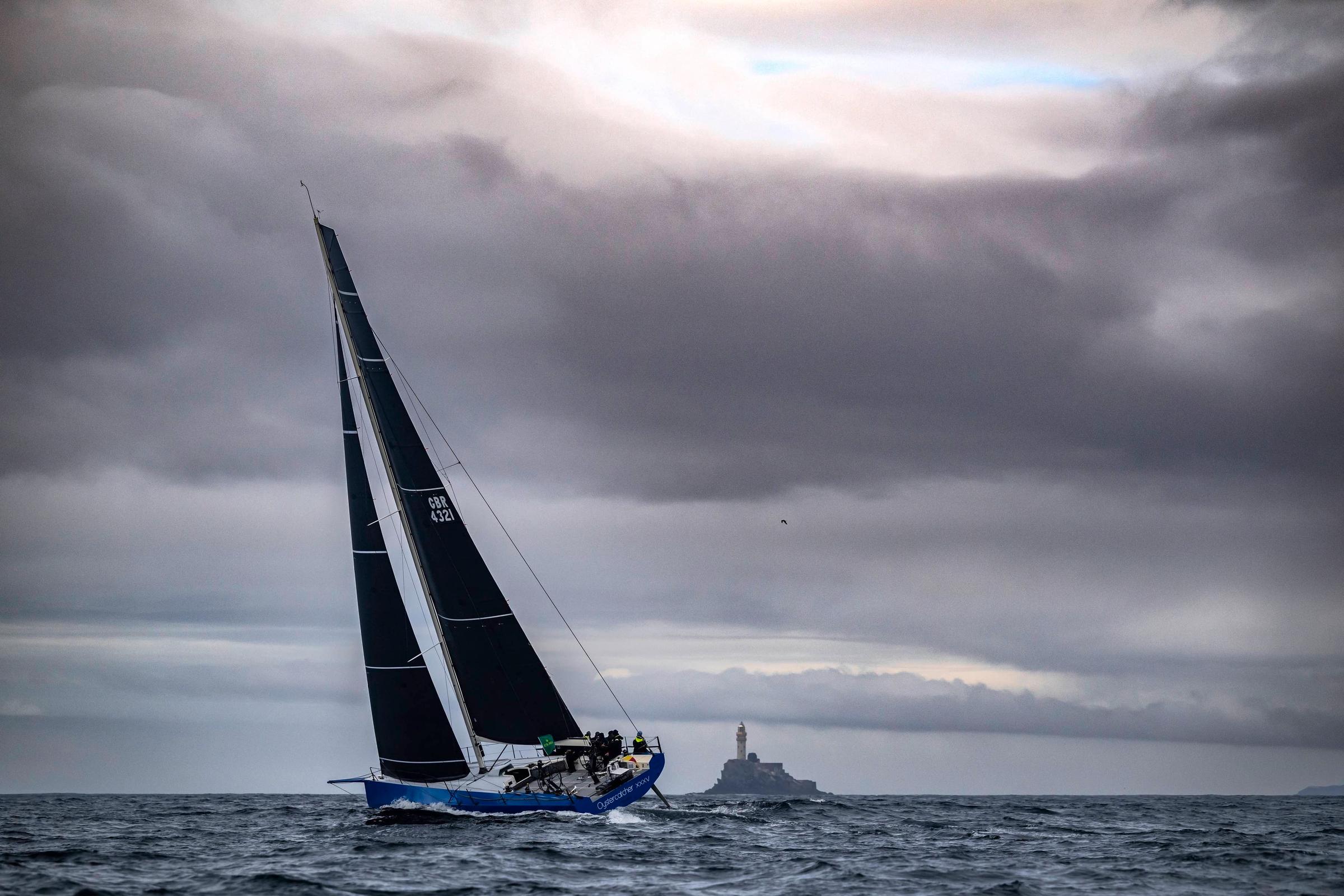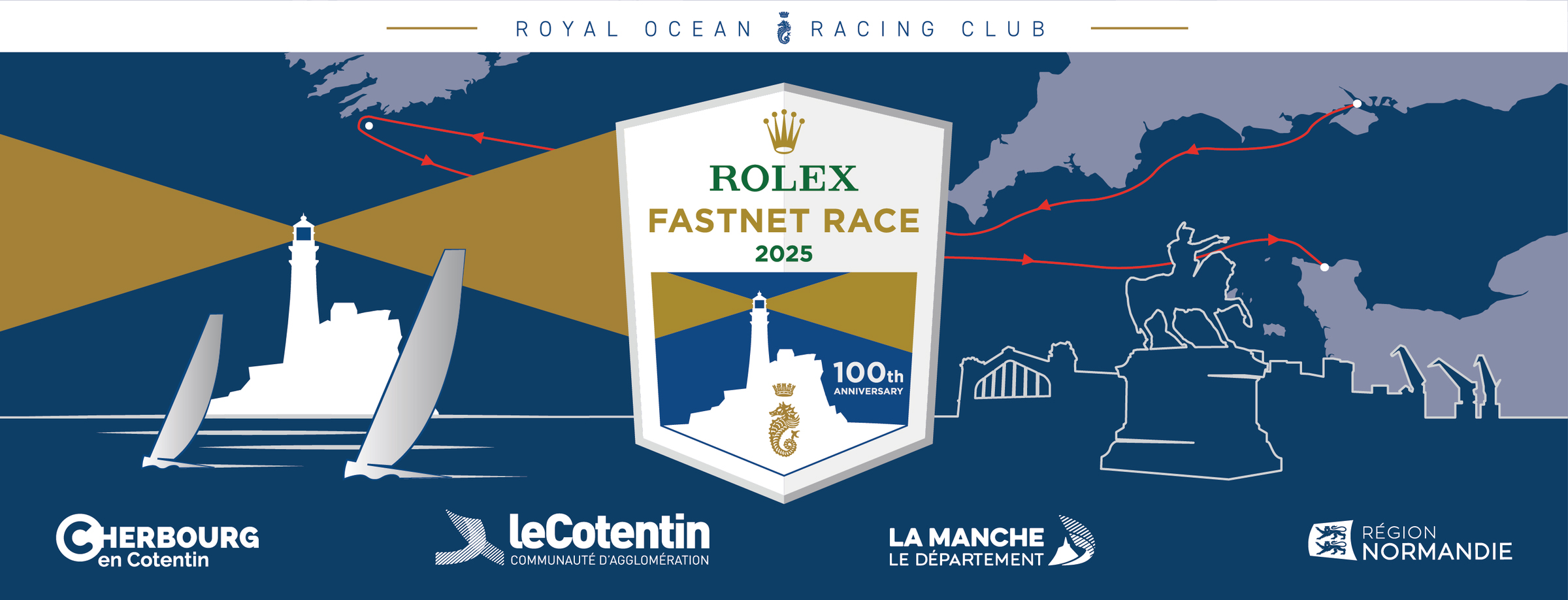

20:00 Friday 1 August 2025
At this evening's prizegiving, taking place in the race village alongside Cherbourg-en-Cotentin's Port Chantereyne silverware is not just being offered to the class winners and podium places. Over the last 100 years the trophy cabinet for the world's largest offshore race has continually grown and includes more specialist prizes introduced by the Royal Ocean Racing Club and many of its members, past and present.
Lawrence Herbert was a little taken aback to discover he was winner of top young skipper in the Rolex Fastnet Race. Aged 28, in a category that’s open to 18 to 30 years, the skipper of J/133 Corazon was surprised he wasn’t pipped to the post by another young gun somewhere in the 444-boat fleet.
Herbert was bowled over to win the trophy. “It’s a pretty big deal,” he smiles. “It feels amazing. I mean it hasn't come out of nothing. We've put it an enormous amount of effort to be here over the past three years.” Corazon set out from the stormy start of the 2023 edition, but not long into the race the team was forced to retire when one of the crew was injured.
So to complete the 2025 race was the first goal, although Corazon also proved to be very competitive, finishing sixth in the 70-boat IRC Two division. Considering this was the category that delivered the top three overall in IRC - three French doublehanded teams led by eventual winner Léon - a sixth place for this British amateur crew of young sailors was very respectable indeed.
“We've basically been working on the boat and making it what it is, and getting the rating down and getting it fast. We feel like this is the first year that we can actually confidently sail the boat through the whole range of conditions that you see in a race and feel like we know what we're doing,” he said.
Herbert is very proud of his team. “They’re friends from a mix of places - friends from uni and sailing, people I met when I was working in the Caribbean and people I've met all over the world, sailing boats. There’s a core crew, and then there's a few other people that sort of dip in and out, as and when they can make races. But we've got essentially 12 people that can come sailing with us quite often, which is brilliant. Everyone loves being on a boat where we're all young and we can make decisions together and work out how to make the boat go fast.”
Corazon is run on a tight budget. “We can’t afford to buy new sails,” he says, “so we’re always looking for secondhand sails we can buy from other boats of a similar size to the J/133. We were running Starlink for 15 minutes every six hours, and we plug it into the battery of a powerdrill. We’re always looking for ways to go fast and be efficient without spending a fortune.
As for advice to other young sailors still on the fence about the Fastnet: “Oh, you’ve got to go. Just go and do it. My brother for example, he's never done a longer race than days. He asked me what it’s like to spend longer out at sea and the answer is that it only gets better as soon as you're past those first two days. Then you can actually feel like you roll into the watches and you get settled and you've got your routine down and sorted.”
 Winner of the Dennis Doyle Memorial Salver for the skipper who has done the greatest number of Fastnet races - Richard Matthews and his Oystercatcher XXXV (26 races) © ROLEX/Kurt Arrigo
Winner of the Dennis Doyle Memorial Salver for the skipper who has done the greatest number of Fastnet races - Richard Matthews and his Oystercatcher XXXV (26 races) © ROLEX/Kurt Arrigo
Compared with the hustle and bustle of normal everyday existence on land, the ‘always on’ nature of modern living in 2025, life at sea becomes very straightforward. “I think that for people who like focussing on single tasks, well when you’re offshore racing there’s only one task: how to make the boat go around the course as fast as possible. That's all you do for five days and there’s a beautiful simplicity to that.”
Which is why Herbert concludes: “I want this to be the first of many Fastnets that I finish. I mean, I can’t imagine ever wanting to miss out on the Fastnet.”
With such an aspiration he would do well to look to Richard Matthews who won the Dennis Doyle Memorial Salver for the skipper who has done the greatest number of Rolex Fastnet Races, including the current one.
by Andy Rice
